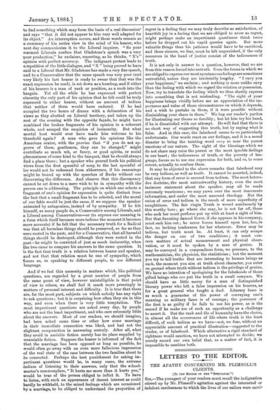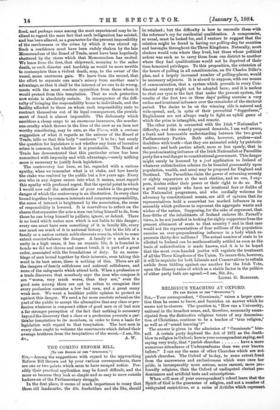LETTERS TO THE EDITOR.
THE APATHY CONCERNING MR. PLIMSOLL'S CLIENTS.
[To THY Of 6rsornos."1
BDITOZ TEE
Sta,—The youngest of your readers must recall the indignation stirred up by Mr. Plimsoll's agitation against the interested or indolent carelessness to which the lives of our sailors were sacri-
Seed, and perhaps some among the most experienced may be in- clined to regard the mere fact that such indignation has existed, and has been allayed, as a guarantee for the present impossibility of the carelessness or the crime by which it was stirred up. Such a confidence must have been rudely shaken by the late Memorandum of the Board of Trade, must have been hopelessly shattered by the storm which that Memorandum has excited. We learn from the first, that shipwreck, meaning to the sailor death, or such disaster and hardship as would be more terrible to contemplate than a violent death, may, to the owner of the vessel, mean enormous gain. We learn from the second, that the effort to separate one man's misery from another man's advantage, so that it shall be the interest of no one to do wrong, meets with the most resolute opposition from those whom it would protect from this temptation. That no such protection now exists is absolutely certain. In consequence of the diffi- culty of bringing the responsibility home to individuals, and the facility afforded to those on whom such responsibility rests to contract themselves out of its legal consequences, the punish. ment of fraud is almost impossible. The dishonesty which sacrifices a cheap cargo to an enormous insurance, the murder- ous cruelty which throws in the lives of the crew as an item not worthy considering, may be rare, as the Times, with a curious suggestion of what it regards as the animus of the Board of Trade, tells us that this body " confesses " it to be ; but surely the question for legislators is not whether any form of lucrative crime is common, but whether it is punishable. The Board of Trade has demonstrated that this particular crime has been committed with impunity and with advantage,—surely nothing more is necessary to justify fresh legislation.
The controversy has been, so far, regarded with a curious apathy, when we remember what is at stake, and how keenly the stake was realised by the public but a few years ago. Every one who in any degree enters into what it means, must regard this apathy with profound regret. But the special point to which I would now call the attention of your readers is the growing danger of which the controversy is an illustration. In every class bound together by common interests and corporate responsibility, the sense of interest is heightened by the association, the sense of responsibility is lowered. It is marvellous to reflect on the chasm that separates the acts a man can bring himself to do, from those he can bring himself to palliate, ignore, or defend. There is no bond which unites men which is not liable to this danger ; every one mast have seen something of it in family life, every one must see much of it in national history ; but in the life of a family or a nation certain noble elements come in, which to some extent counterbalance the danger. A family or a nation is a unity in a high sense, it has an organic life, it is founded in bonds we did not choose and cannot break, it is part of a great order, associated with the foundations of duty. In an assem- blage of men bound together by their interests, even taking this word in its best sense, there is nothing of this. There are all the dangers of family selfishness and national selfishness, and none of the safeguards which attend both. When a profession or a trade discovers that somebody says the men who compose it are " worse, very much worse, than they are," even the good men among them are apt to refuse to recognise that every profession contains a few bad men, and a great many weak men. We want a healthier public opinion to protect us against this danger. We need a far more resolute refusal on the part of the public to accept the alternative that any class or pro- fession whatever is composed either of good men or of bad men a far stronger perception of the fact that nothing is necessary beyond the discovery that a class or a profession presents a par- ticular temptation to its members, in order to form a basis for legislation with regard to that temptation. The best men in every class ought to welcome the enactments which defend their average brethren from the temptations of the worst.—I am, Sir,
A. W.







































 Previous page
Previous page